Issue Number 54, Fall 2021

Contents
- Autumnal Equinox, Twenty-Twenty by Sharon Tracey
- Me and Prairie Dropseed by Sharon Tracey
- The East Troublesome Fire, October 2020 by Debbie Gilbert
- Nocturne by D. James Smith
- Sly Park by Craig Segall
- King Fire by Moira Magneson
- The Hare by Maggie Wadey
- A Moment of Stillness by Gary Lark
- Ghosts by Luke Wallin
- The disappearing by Sue Proffitt
- What's leaving me by Sue Proffitt
- Succession by Lois Levinson
- While You Were Sleeping by Lois Levinson
- A Silent World by Perissa Busick
- ARANEUS DIADEMATUS by Krikor N. Der Hohannesian
- The Owl by Richard Lebovitz
- Postcards from the River by Susanna Lang
- Caution, Butterflies by Zoe Boyer
- Having Spent a Lifetime Raging by Alene Boyer
- And If It All Seems Pointless by RJ Rice
- The Second-Best Time by Ann Pedtke
Archives: by Issue | by Author Name
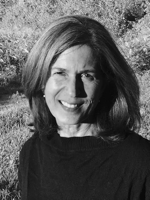
Autumnal Equinox, Twenty-Twenty
by Sharon Tracey
Sharon lives at the edge of field and conservation land in the Connecticut River watershed in Western Massachusetts. The Connecticut is the region’s longest river, flowing through five states, from the Canadian border to Long Island Sound.

The sun slipped under houses,
one moment light, then a
finger’s small poke on the
horizon to start again the
dark.
Animals understood except for
us who stayed inside,
somehow far less equipped.
We brace ourselves— for
days of shorter straws, a maw
that won’t be sated until the
last drop is squeezed and
doled out.
Which should be no surprise
but we forget. This is the
world.
Gather up the children.
Be alert past twilight.
See that the deer have bedded down. This
is the world.
A half-cup of light, half-cup of dark.
© Sharon Tracey

Me and Prairie Dropseed
—As for man, his days are as grass Psalm 103:15
by Sharon Tracey
Sharon lives at the edge of field and conservation land in the Connecticut River watershed in Western Massachusetts. The Connecticut is the region’s longest river, flowing through five states, from the Canadian border to Long Island Sound.
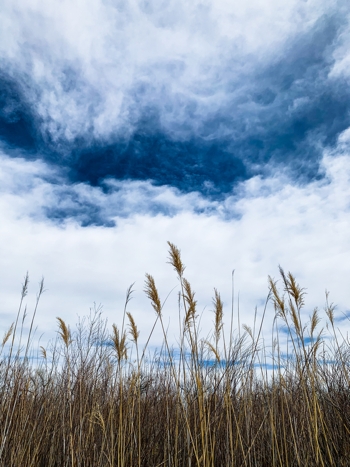
I have fallen for the ones spilling
forth in fountains
of stems and flowered panicles, June’s
green now October’s copper
and I’m lying here with them at
eye-level—looking through—
bronze to sky blue— and
close-up,
the only way to see everything,
quivering and falling
as the chickadees in black caps come
to snack and keep good company.
I do believe in beginnings
and endings, and yet
I can never accept November
as the last ones
are eaten or buried and the
world keeps churning
cruelty and beauty in equal measure,
and we keep hoping for
more of the latter, even the
smallest seed.
© Sharon Tracey

The East Troublesome Fire, October 2020
Perhaps it’s not the poet anymore
who writes the poem.
—Aleksandr Blok
by Debbie Gilbert
Debbie lives in a Connecticut woodland surrounded by the Purgatory Brook which collects snowmelt and rainwaters from Talcott Mountain and carries them to the Farmington River where the river turns northward.

The horses are screaming.
Their nostrils flare
and they suck in a black mid-day sky
while winds fill with acrid ash
and instinct begs, Run.
They run.
Run with coyotes and the prairie dogs.
And the hollowed-aspen owlets can’t keep up.
Are shadows born in the light of flames?
The Front Range is burning.
Smoke is in the pasture.
There’s orange in the hills.
And the sheriff posts pink notices
on barn doors— Go.
Close the gates and write a note:
a phone number on a duct-taped hoof.
Load four in a two-horse trailer—
two pregnant mares,
two colts still wet.
The Front Range is burning.
Release the herd over the Great Divide—
East toward Estes and Loveland.
Remington, Wrigley, Slick, and Satchmo—
Who stays? Who goes?
The trails are no longer marked.
Fill the prairie troughs with water
and watch the horses go.
Blue Jeans Tilly is at a full gallop—
all four hooves lift from hot scorched land.
The Earth itself is thundering
and the air slices aside—
a charred world is underfoot,
a sliver open to new sky.
Bless the starred black horse
with the one blue eye.
Give her water.
© Debbie Gilbert
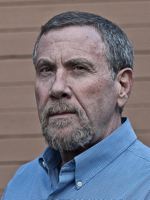
Nocturne
by D. James Smith
Smith lives in the irrigated, semi-arid desert plain of California's central valley, spending a great deal of time in the nearby foothills and the Sierra.

After the cattle plod home in darkness,
and the stars wheel into place,
I pick my way down to study the river.
It’s low, just a murmur pouring
through roots of willows, rocks of granite.
Wind sends some pine needles sideways
and my eyes drift up and see light from the city
is a bridge spanning blackness.
I realize I’ve abandoned all plans to make a home here.
There’s no time for that. Regret, and a plan.
Riffles run the surface of the water like an unnamed desire
that fans up the neck, and I climb the ridge
to the truck and drive away slowly, thinking how
I’ve been looking, always reading, then, recently,
the doctor’s diagnosis making my mind suddenly
clear as water, like today when I came out of the trees
to find deer, feeding quietly along a stream.
Previously published in Cold Mt. Review
© D. James Smith

Sly Park
by Craig Segall
The Lower American River flows past, still wild, not far from Craig's home and garden. He spends his days trying to protect air quality while his wife Lilly restores salmon runs on the river; they both hope it runs clear and cool past the cottonwoods for years to come.
Standing on the bottom of a lake
half-way up the high Sierra;
a rime of gold leaves from bankside aspen,
are sunset clouds in the mirrored surface;
soft mud billows,
set spinning by the streamers of my breath rising.
I have seen this crenulated country unfold, spire on spire
from the high peaks in the sharp pine air,
canyon branch and lake glint,
and all the world turning.
Your heart would catch at the sweetness of it:
The light slanting down all the way to the Pacific.
Under those shining lakes, those bright sun-dancing waters,
granite caught and forest kept,
this long gray plain of bone dust, this cold and cloistered silence.

© Craig Segall
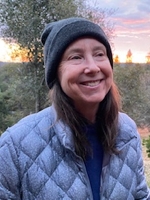
King Fire
by Moira Magneson
Along with gray foxes, quail, mule deer, and coyotes, Moira lives on a parcel of clay-red earth in the Sierra foothills. An ephemeral creek threads through her land, a reminder of the nature of impermanence.

I tramp the dead
dry creek bed
boots sinking
into ash.
What is
holy here?
There are no
visible bones—
I must be
breathing in their dust—
no bodies,
neither squirrel scramble,
nor crow caw,
or flashing white
rump of bounding deer.
No silver minnow
or jumping frog.
No skink slipping
in underbrush. No
bird or leafsong
Only this
congregation of ghosts,
blackclacking fir
and broken
oak bowing
before a blue
unblinking eye.
© Moira Magneson
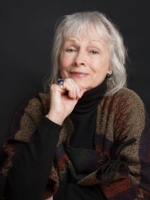
The Hare
by Maggie Wadey
From Maggie’s desk in Hackney, East London, she looks across a park to the Olympic Site, where there's a sense of a big open sky and the Thames River, with its wide flat estuary, being within easy reach. In her narrow, city garden she has grey squirrels, foxes, a lot of cats, 'cockney' sparrows, crows and green parakeets.

A hare isn’t always in a trap
or hanging from a butcher’s hook.
It isn’t always being jugged, or stewed,
nor is it necessarily a symbol for something else,
a fairy story, or a woman gone mad. A hare isn’t
always the subject of a sketch or even a poem.
Mostly, it is itself, rare, but somewhere out there
on the hillside or in the grass beside the river,
super-vigilant, the way hares are, sleeping with its
gentle eyes wide open, a creature of that light
which falls between day and night. And the fact
that we don’t see her doesn’t mean she isn’t there -
she has no need of us to claim or name her.
Take yourself out of the picture. Leave her free
to race beyond the snare of your words.
© Maggie Wadey
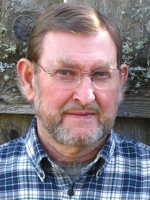
A Moment of Stillness
by Gary Lark
Gary grew up on the Umpqua River and considers it his primary mentor and metaphor. He currently lives near the Rogue River in Oregon.

In the basin of McCoy Canyon,
willow, aspen and sage,
the creek running cool
under October sun,
a dark hued rainbow
startles and runs back
under rock shadows.
If I'm careful
I can slip my hand
into the shadow
under the fish
and slowly raise it
until I can feel
the fish finning
my palm.
© Gary Lark
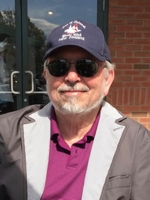
Ghosts
by Luke Wallin
Luke lives in the Sakonnet River watershed basin near the Atlantic Ocean on a stream that flows north.

After dark we
shared the glider
on the porch.
I felt your warmth
as stars came out
from haze.
Some distance off
coyotes began to wail.
Banshee entwined.
You sipped brandy.
We discussed strange
moving lights above.
Then they came,
running down our drive,
two silver coyote ghosts.
We hushed as
they floated in the
rising fog.
Your pleasure reminded
me of when I called the
owls from oak silhouettes.
You were frightened,
deliciously.
I was young.
© Luke Wallin
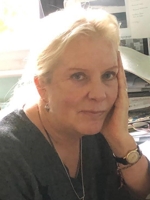
The disappearing
by Sue Proffitt
Sue lives in Hallsands, a remote settlement and beach situated in Start Bay, South Devon, England. Her favourite walk is from her cottage to Start Point, one of the most exposed peninsulas on the English coast, running sharply almost a mile into the sea. The lighthouse at the end of the headland has guided ships in passage along the English Channel for over 150 years, and the coastal cliffs are the oldest in Devon. The coastline here is still wild, and home to many wild flowers, birds and animals.
Wildcat. Red squirrel. Watervole. Hazel dormouse. Hedgehog.
Intone them solemnly
as if this makes them real, as if mouth, tongue against teeth,
small plosives, exhalations,
summons each one before me. Three of these I’ve never seen.
Flash their images
up on a screen as if this makes them real. Somewhere, the last ones
occupy pockets
of ravaged cloth – Earth’s skin crumbling to dust – we’re left with
something bleached,
exposed, like the small relic of curves and holes I found yesterday
on the Tor in a litter
of granite. I picked it up: slippery tendons, bundles of nerves once
flowed through
each socket; this once held a river, pulsing. I put it in my pocket,
and do I do this
to soften the loneliness of its death? (Imagining this.) The truth is that
none of the disappearing
know self-pity. There’s a bird – I don’t know its name, it doesn’t know
our name for it –
but it hears nothing answer when it announces itself over and over,
meeting only
other different names and a silence which is unblinking, which doesn’t
look away.
Something announces itself in the mind, the heart. It’s time.
The disappearing
know the edges of themselves creep closer every day. My hand clutches
its bit of bone
as if holding something back.

© Sue Proffitt

What's leaving me
by Sue Proffitt
Sue lives in Hallsands, a remote settlement and beach situated in Start Bay, South Devon, England. Her favourite walk is from her cottage to Start Point, one of the most exposed peninsulas on the English coast, running sharply almost a mile into the sea. The lighthouse at the end of the headland has guided ships in passage along the English Channel for over 150 years, and the coastal cliffs are the oldest in Devon. The coastline here is still wild, and home to many wild flowers, birds and animals.
Something’s changed in the heart. A giving-up. Not true, because
look at the body – its insistence
on multiplying cells, its obstinate battery refusing to putter out
yet. I’m not hungry, but I will be.
Here’s my coffee, to hand. All the signs of pressing on, regardless.
My words insist, still, on arriving,
like the spiders in the laboratory whose webs were systematically
destroyed every morning,
who continued to weave. An experiment in hope – can it be killed?
I don’t know how long
it took; I see those small engineers staying up many nights, spinning –
perfect architecture held,
prismatic, in their brains: it’s what I do. It’s who I am. Until something
changes. A knowing, heavier
than stone, heavier than anything tied to a body and thrown into water –
sinks in, right to the bottom.
Not a carelessness but an absence of hope, intimate with demolition,
moves in, oversees
disintegratation. In the end, a few threads any old how, knotted.

© Sue Proffitt

Succession
by Lois Levinson
Lois lives at 5,600 feet at the western edge of the Great Plains and in view of the front range of the Rocky Mountains. She loves to wander in riparian and montane habitats in search of birds.

After the hurricane,
after the flood,
they tore down
the house
where I grew up,
leveled all
the ruined houses
and proclaimed
the empty lots
a park.
Now thick woods thrive
where my house
once stood,
with an understory
of saplings, vines,
dogwood and clover,
perfect habitat
for the finches
and cardinals
who've taken up
residence
at my old address,
as though waves
of destruction
and rebirth
had scoured away
the footprints
of my childhood,
as if home was just
a borrowed thing,
the forest
biding its time,
waiting
to take it back.
© Lois Levinson

While You Were Sleeping
by Lois Levinson
Lois lives at 5,600 feet at the western edge of the Great Plains and in view of the front range of the Rocky Mountains. She loves to wander in riparian and montane habitats in search of birds.

The cut scar
on the old maple
has ruptured
in an effusion
of mushroom conks
multiple layers
of fattened fungus
the size of a
basketball
extruded
from the heart
of the tree
a cry of terror
propelled
to the surface
a frantic warning
of a fermenting
scourge
a vile fizzing
effervescing
beneath
a metastasizing
malevolence
its insidious
tentacles
clawing
upward.
© Lois Levinson

A Silent World
by Perissa Busick
Perissa lives in a circle of trees – pine, oak, cedar, madrone and manzanita – homes to families of bluejays, robins, ravens and sparrows plus many smaller creatures.

I heard them
In my heart
last night
deep
In that timeless
land where
mind goes
when free of thought,
and untethered
to time and place,
it flows and wanders.
And I hear them still:
the howl of the last wolf,
the lone elephant’s
trumpeting calls,
and the whale’s cry
as their lonely sojourn
ends. Betrayed by
the two-legged,
they wander aimless,
no pack to guide them,
no herd to nurture them,
no pod to love and play within,
their footprints all that remains
save the ivory tusks
carved into breathless mementos,
a souvenir wolf’s head
adorning a wall,
and tales of the magical
leviathans of the deep.
Will we hear the last whale song,
the last elephant’s call and the
last wolf’s howl -- and see only
our own footprints left to mark
the earth?
© Perissa Busick

ARANEUS DIADEMATUS
by Krikor N. Der Hohannesian
Krikor lives next to the Mystic Lakes section of the Charles River watershed which empties into Boston Harbor - now relatively cleansed of pollutants.

As if by nature’s sorcery,
back-lighted by an orange harvest moon,
the alchemy of spinnerets -
protein into silk, gossamer
suspended between eave and gutter
at the whim of a puff of wind
or the weight of raindrops,
a sparrow’s hunger.
Come morning, droplets of dew,
hung on night’s mist, diadem
the filaments lustered by low
shafts of sunrise, elegance
to rob the breath. Each night
a prayer for its survival. Like
matins and vespers added
to a diurnal ritual, a treasure
of communion, of serenity,
nothing asked in return. Seven
days it defied wind, rain
and predator, a damselfly
or two sustenance enough.
Then, whisked away
on stealthy wings
of the first light frost.
© Krikor N. Der Hohannesian
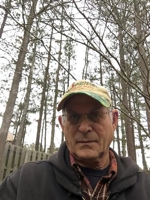
The Owl
by Richard Lebovitz
Richard lives in the Upper Chattahoochee Watershed in the Georgia Piedmont. His small backyard is a National Wildlife Federation (NWF) Certified Wildlife Habitat and Georgia Native Plant Society (GNPS) Certified Native Plant Habitat, and he participates in GNPS rescues to save native plants from the path of development.

From its perch in the shadows,
the rescued owl peers
into the darkening distance,
waiting for night.
If it despairs of its bandaged wing,
it doesn't show it.
If it yearns to escape,
by what signs will we know it?
It doesn't pace its cage in silent rage
or flail its wings in futile flight
but stands sentry as the daylight fades,
waiting for night.
From its perch in the shadows,
the rescued owl peers past visitors
and refuge fence, beyond the din
and lights of city streets,
to the darkening fields and forests
of owldom.
© Richard Lebovitz

Postcards from the River
by Susanna Lang
I wrote the poem along the North Branch of the Chicago River, which is also listed as the watershed for the zip code where I live.

Last night’s rain brought down
a scatter of yellow leaves
still sailing with me this morning.
A goldfinch flies over my shoulder.
* * *
I run between and around you.
I slip beneath your bridges.
I make common cause with what lives along my banks:
monarch, grasshopper, milkweed, hawk.
You, too—you come here sometimes
to walk between land and water.
* * *
A small boy has persuaded a fuzzy caterpillar
to crawl up his arm.
The boy’s mother offers to take a photo
before he leaves the caterpillar behind—
that wasn’t part of his plan.
* * *
I host my own air and water show
though I don’t make so much noise about it.
Look, you have disturbed an entire flock of finches—
they rise in their undulating waves
singing defiance.
* * *
I am fat with the summer’s rain,
water lapping over my banks,
making the long grasses dance
to its rhythm.
The song of the katydids is fuller now,
more layered with voices.
Seed pods split open, spill their wealth—
more gold for next year.
Small bitter fruits form in the branches:
they are not for you.
* * *
We are different today than we were yesterday.
Even you can sense that the air is thicker
and the wind holds the promise of more rain, maybe thunder.
Some birds—warblers, swallows—have already left.
You may not know how to notice an absence.
* * *
You have dug up my banks again,
mounded the dirt.
Your heavy trucks push and tug at the world.
But the soil carries its seeds within
and now the mounds have adorned themselves—
goldenrod, cone flower, asters, bee balm.
* * *
Some of the lost have returned.
A great blue heron fishes in the shallows,
black-crowned night heron on a fallen log,
cormorant midstream, hawk overhead.
One of each kind. How many more will return?
How many more will never come back?
© Susanna Lang

Caution, Butterflies
by Zoe Boyer
Zoe grew up on the land of the Council of the Three Fires: the Potawatomi, Ojibwe, and Odawa Nations, where she sailed and paddled on Lake Michigan. She now lives on the land of the Yavapai-Apache Nation in the Verde River watershed, tucked among the ponderosa pines.
Just when I've grown accustomed to the unlikely green of the
world beyond my windows—summer’s brown and burn
displaced by monsoon rain—nature outdoes itself with a
Jackson Pollock spatter of yellow flung across the yard:
cloudless sulphur butterflies flitting through the trees, color
rioting on wings, acid-bright and incandescent as the sun.
Remarkable to think they are masters of disguise, petal-hued
as their favorite feast of senna, when here against the somber
green of juniper and pine they blaze bright as supernovae;
bold enough to stop traffic, bold as the sign sprouting
daffodil-like on Highway One urging: Caution, Butterflies;
a yellow like a warning to wake from the stupor of another
dull day and pay heed to the world’s flash and flutter.

© Zoe Boyer

Having Spent a Lifetime Raging
by Alene Boyer
Alene lives in the Great Lakes/Calumet River watershed and has walked along the ever-changing western shore of Lake Michigan at sunrise nearly every day, in every season, for over 25 years.

I’d rather go gentle as driftwood goes,
groundless, fluvial, relinquish my grip
on the life I know, slip down a steep
bank and into the flow of a fast-moving
stream, travel effortlessly from old growth
tree to pontoon for fungi and algae—
a meandering rung between water and
sky for the larvae of net-spinning
caddisfly. I’d rather linger as driftwood
lingers in logjams en route to the sea,
let water eddy where sky used to be,
allow salmon to spawn where birds
once built their nests, trap seeds and
silt, learn to improvise, grow grasses
for shrews, chipmunks, voles and deer
mice, who’ll tempt the reflections of
hawks to fly across limpid, limb-cracked
mirrors of sky. I’d rather drift the way
driftwood drifts into flowing estuaries,
unruffled by tides and the coming and
going of bald eagles, cormorants, herons,
and snakes who’d perch while I glide
through the brackish firth, leaving only
ripples in my wake. I’d rather sigh
the way driftwood murmurs and sighs
when it reaches the sea—what a relief,
after centuries staving off bark beetles,
budworms, root rot, and drought, to open
my heartwood to shipworms and gribbles,
be honeycombed into a floating reef.
I’d rather lie the way driftwood lies, at last,
on the beach—wave-worn, sun-bleached,
worm-riven, still. The sun can burn and
rave at close of day and the sea can rage;
let the tides wreathe me in rockweed,
sea lettuce, sargassum, and kelp, and the
tiny gray sand hoppers have their fill.
© Alene Boyer

And If It All Seems Pointless
by RJ Rice
RJ lives in the mountains north of Yellowstone Park in the Gallatin subbasin of the Missouri watershed.
drive out one morning early
away from the binge-talkers, the roughness of crowds.
Walk in the untilled fields, quiet with autumn,
where new snow gives off the light it gathered
on the way down. Geese lift calling and flow south,
doing good the only way they know.
Now is not the time for contemplating spring. Time
drifts here without intention. Release
what your white-knuckled heart
needs to set down. A dozen trees are your witness.
Let your life turn and face you. This matters more
than the sum of your distractions. Forgive yourself.
And don’t encourage your thoughts: The ones obsessed
with yes this, no that? Those thoughts.
When there’s nothing left between gaze and leaf
disquiet fades. Astounded and unburdened
you hardly know what you know.
Praise is the peace that begins.

© RJ Rice

The Second-Best Time
for Brendan
by Ann Pedtke
Ann lives at the mouth of the Hudson River Estuary – known to the Lenape people as Muhheakantuck, or "the river that flows both ways," where freshwater and saltwater meet to support a great diversity of life.

There are many good places
to plant a tree –
for example, this old cracked bucket
on the back stoop –
or just at the side of the gravel drive
in that spot where the tires always skid
a bit off-course
as a visitor comes to grips
with the curve of the hill.
This sapling springing from the rain gutter
must be rescued
like a kitten from a limb
and settled safely on firm ground.
This maverick sprig of oak
rising from the geranium pot
like a cuckoo in a stolen nest
must be tucked carefully
into a new home all its own.
There are many good times
to plant a tree –
for example, just as dinner is ready –
on a whim perhaps
before setting out for the airport –
or the precise moment the light shifts
and rain begins to fall.
The proverb says the best of all times
is twenty years ago
but the second-best time
(as you have always known)
is now.
© Ann Pedtke